Thousands of Britons are confusing the “normal stresses of life” with mental health problems and are misdiagnosing themselves with psychiatric illnesses, one of the UK’s most eminent GPs has warned.
Professor Dame Clare Gerada, former president of the Royal College of General Practitioners, told MailOnline that Britain has a “problem” with people “looking for labels to explain their concerns”.
Professor Gerada’s concerns echo those of former Prime Minister Sir Tony Blair, who yesterday warned against overmedicalizing the ‘ups and downs of life’.
Sir Tony, who served as Prime Minister from 1997 to 2007, said there was a danger in telling too many people going through life’s normal challenges that they suffer from a mental health condition.
“There are people of all ages who want a diagnosis or a label,” Professor Gerada said.
“They would rather have a label than consider why their life might be challenging or where it might have gone wrong.”
Professor Gerada’s comments add to a growing chorus of concern among some of the UK’s leading psychiatric professionals, who say self-diagnoses of mental illness are increasing pressure on an already strained NHS.
Dr Sameer Jauhar, a psychiatrist and senior clinical lecturer at King’s College London, told MailOnline there was a “huge” difference between the symptoms people “self-report” and the medical criteria for diagnosing a mental illness.
Professor Dame Clare Gerada, former president of the Royal College of General Practitioners, said the UK had “reached a tipping point” and people were looking for labels “to explain their concerns”.

Former Prime Minister Sir Tony Blair yesterday warned against excessive medicalisation of life’s “ups and downs”.
“When many people talk about their mental health, they often describe something other than what we call depression in the profession,” he said.
‘Clinical depression is not just a low mood. They are motor effects: someone’s body movements slow down, for example.
‘It can affect your attention, your concentration, your memory. Just saying you have a low mood doesn’t necessarily mean you have depression.
“When Tony Blair says people are self-diagnosing, he’s right.”
Professor Carmine Pariante, an expert in biological psychiatry at King’s College London, also warned that increased awareness of mental health conditions has led some people to “think they have an illness rather than simply experiencing difficult levels of stress or anxiety.” that come with life.”
He told MailOnline: “Many people who have significant levels of depression don’t seek help, which is a big problem.”
“But for many others, we need to be brave and give people reassurance that what they are experiencing is normal and help them take responsibility for their well-being by doing things to improve their emotional health, such as exercising or seeing friends ‘
The latest statistics show that the number of people seeking help for mental illness has increased by two-fifths since before the pandemic, reaching almost 4 million.
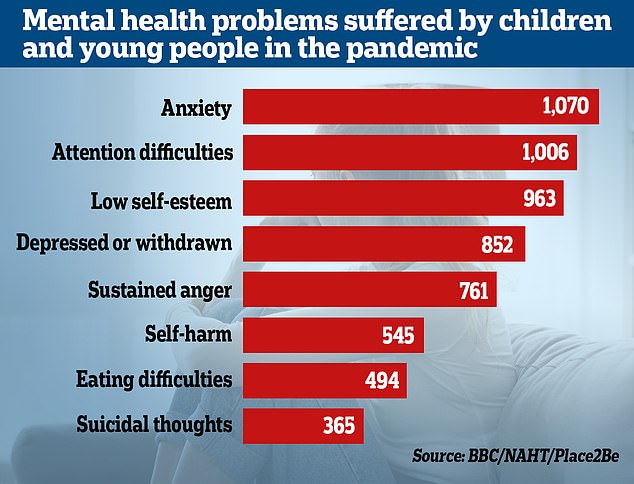
More than 200,000 children in England, or 4,000 each week, were waiting to start treatment over the past year.
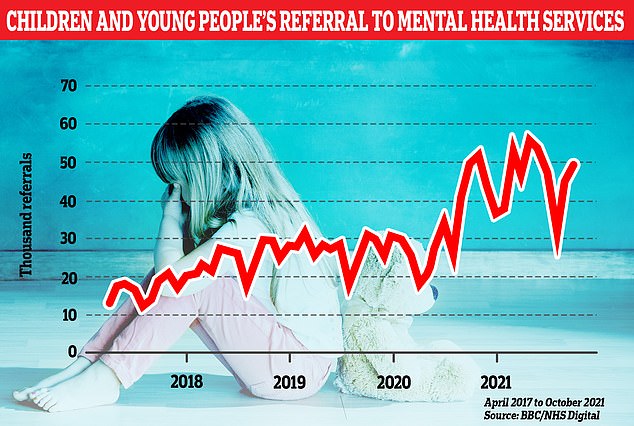
Shocking new figures show the number of children referred for specialist treatment for anxiety has doubled in just four years.
Meanwhile, the latest figures from the Office for National Statistics (ONS) show that almost a quarter of children in England now have a “probable mental disorder”, up from one in five last year.
Professor Gerada said one of the main factors driving misdiagnoses is the widespread “inappropriate use” of terms used to describe mental illnesses.
She said: ‘IInstead of saying “I’m sad today,” children will use the words “I’m depressed or anxious today.”
‘People mistakenly think that loneliness, homesickness, exam stress and even stress at work are mental illnesses.
‘When you go to university, it’s normal to feel alone, to feel like you don’t know where you are, to feel homesick. That’s normal. That’s not a mental illness.
“We need to break the expectation that we’re supposed to be miserable.”
While many find it difficult to work when they feel depressed, Professor Gerada said, the routine of work life can be an effective mood booster.
‘There is “It’s been a temptation to take time off work when life becomes challenging,” he said. “But actually work is what will protect you.”
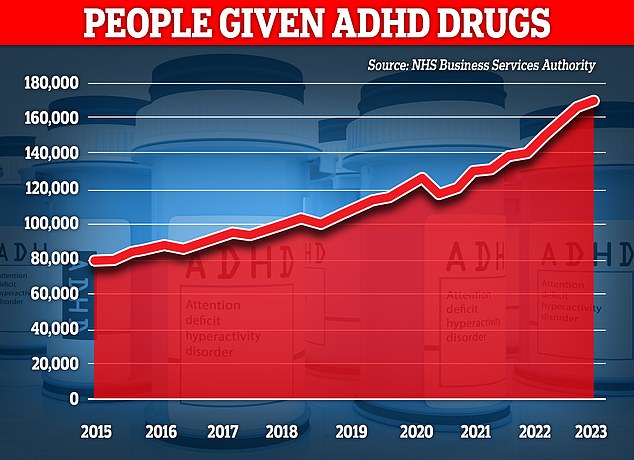
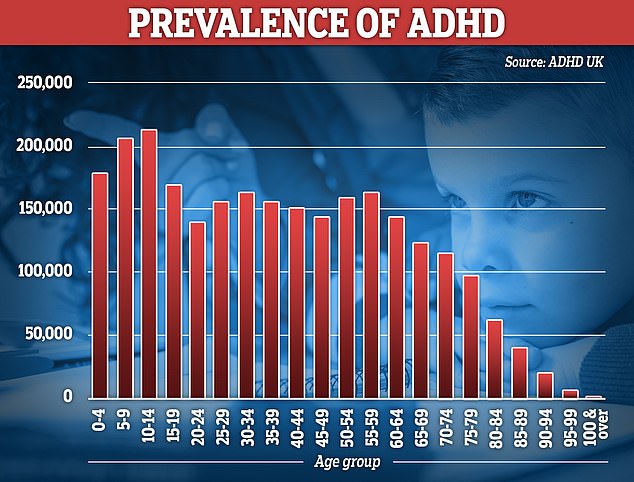
Speaking on the Jimmy’s Jobs of the Future podcast yesterday, Sir Tony said Britain had become “very, very focused on mental health and people self-diagnosing.”
The former prime minister added: “We are spending a lot more on mental health now than we were a few years ago.” And it is difficult to see what the objective reasons for this are.
‘Life has its ups and downs and everyone experiences them.
“And you have to be careful about encouraging people to think that they have some kind of condition other than just dealing with life’s challenges.”
Responding directly to his comments, Professor Dame Clare said: ‘We are spending more and more on mental health and we see worse and worse mental health.
‘Where mental health resources need to be spent is on inpatient beds, patients with severe psychosis, severe depression, bipolar disorder and people with drug and alcohol problems.
‘We seem to be spending more and more on diagnosing 26-year-olds with ADHD and putting them on lifelong medications that can cause addiction, psychosis, dependency and physical health problems.
“We’re spending it in the wrong place.”
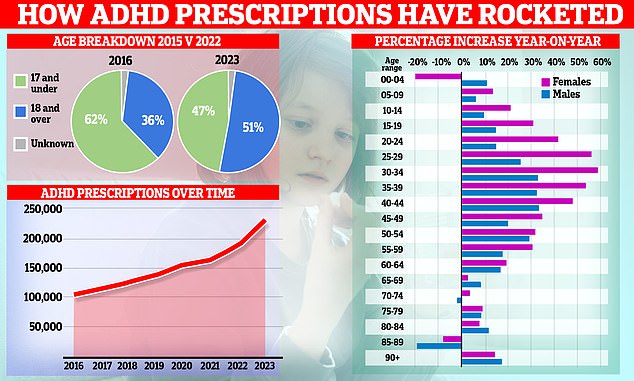
Last year, the NHS launched a task force to examine a worrying rise in the number of children and adults diagnosed with attention deficit hyperactivity disorder (ADHD).
Yesterday, Professor Brendan Kelly, a psychiatry expert at Trinity College Dublin, also warned that it was important for Britons to avoid “over-medicalising things”.
“The problems we face every day, the problems we face at work, the problems with other people, are not necessarily mental health problems or mental illnesses,” he said.
“I think we need to think carefully about not disempowering people to find solutions to the problems in their lives by suddenly declaring that they have a mental illness.”
he said The hard shoulder podcast: ‘Some life problems, the ups and downs of life, the stress, some of the consequences of relationships are not mental health problems, they are life problems.
“There’s no benefit to labeling all of these as mental health issues if it doesn’t empower the person to find solutions.”
In October, NHS England said it was treating 55 per cent more under-18s than before the pandemic.
At the time, a spokesperson added: “We know there is much more to do to reduce unacceptably long waits for patients and ensure every young person who needs it can access specialist mental health support.”
“We have added 40,000 additional mental health staff and plans are in place to ensure more than one in two pupils and students in schools and colleges have access to an NHS mental health team in the classroom by spring 2025, well ahead of the original.’
Dozens of studies have recently highlighted how the pandemic and subsequent lockdowns have hampered children’s development and may have exacerbated mental health problems.
Researchers have found that young people from all economic backgrounds have suffered setbacks in their emotional and social development.
The unprecedented stay-at-home orders and school closures were among the key policies introduced at the beginning of the pandemic and greatly disrupted children’s lives.
In August, worrying new figures also showed that the number of children referred for specialist treatment for anxiety has doubled in just four years.
More than 200,000 children in England (or 4,000 each week) were waiting to start treatment over the past year.
This is an increase of more than 100,000 compared to 2019/2020, when almost 99,000 were stuck in the queue.


